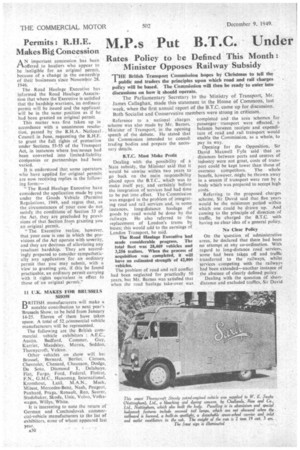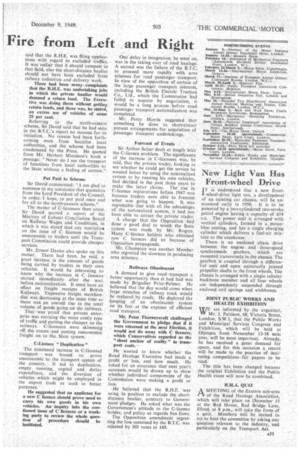M.P.s Put lEt•T•Ce. Under Fire from Left and Right
Page 32

Page 33

If you've noticed an error in this article please click here to report it so we can fix it.
Rates Policy to be Defined This Month : Minister Opposes Railway Subsidy
THE British Transport Commission hopes by Christmas to tell the public and traders the principles upon which road and rail charges policy will be based. The Commission will then be ready to enter into discussions on how it should operate.
The Parliamentary Secretary to the Ministry of Transport, Mr. James Callaghan, Made this statement in the House of Commons, last week, when the first annual report of the B.T.C. came up for discussion. Both Socialist and Conservative members were strong in criticism.
Reference to a national charges scheme was also made by Mr. Barnes, Minister of Transport, in the opening speech of the debate. He stated that the Commission intended to consult trading bodies and prepare the necessary details.
B.T.C. Must Make Profit Dealing with the possibility of a State subsidy, the Minister said that it would be unwise within two years to go back on the main responsibility placed upon the B.T.C., which was to make itself pay, and certainly before the integration of services had had time to be put into effect. The Commission was engaged in the problem of integrating road and rail services and, in some instances, long-distance haulage of goods by road would be done by the railways. He also referred to the replacement of London's trams by buses; this would add to the earnings of London Transport, he said.
The Road Haulage Executive had made considerable progress. The total fleet was 28,469 vehicles and 3,256 trailers. When the process of acquisition was completed, it will have an estimated strength of 42,000 vehicles.
The problem of road and rail conflict had been neglected for practically 50 years. but Mr. Barnes was satisfied that when the road haulage take-over was completed and the area schemes for passenger transport were effected, a balance between receipts and expenditure of road and rail transport would enable the Commission, as a whole, to pay its way.
Opening for the Opposition, Sir David Maxwell Fyfe said that as distances between ports and centres of industry were not great, costs of transport could be kept lower than those of overseas competitors. The whole benefit, however, might be thrown away in a season if transport were run by a body which was prepared to accept high costs.
Referring to the proposed charges scheme, Sir David said that five years would be the minimum period within which one could be drawn up. And coming to the principle of direction of traffic, he charged the B.T.C. with having no clear idea of a general policy.
No Clear Policy
On the question of administrative areas, he declared that there had been no attempt at any co-ordination. With regard to long-distance road services, some had been taken off and traffic transferred to the railways, whilst services competing with the railways had been extended—another instance of the absence of clearly defined policy.
Dealing with the question of shortdistance and excluded traffics, Sir David
said that the RILE. was filing applications with regard to excludedtraffics. It Wasunfair that it should compete in that field, also the short-distance haulier should not have been excluded from railway collection and delivery work. There had been many.. complaints that the R.H.E. was undertaking jobs in which the private haulier would demand a return load. The Executive was ,doing them without getting return loads, and there was, he stated, an excess use of vehicles of some 25 per cent.
Referring to the north-eastern scheme, Sir David said that he had seen in the B.T.C.'s report no reasons for its initiation. No reason had been forthcoming even from Socialist local authorities, and the scheme had been condemned by the Press. He quoted from Mr. Herbert Morrison's book a • passage: "Never do I see the transport of functions from loeal authorities to the State without a feeling of sorrow."
Put Paid to Scheme
Sir David commented: ".I am glad to summon to my assistance that quotation from the Lord President of the Council, in order, I hope, to put paid once and for all to the north-eastern scheme."
The matter of C-licensees then arose. Sir David quoted a report of the Ministry of Labour Conciliation Board on Railway Wages and. Conditions, in which it was stated that any restriction on the issue of C licences would be uneconomic to traders until the Transport Commission could provide cheaper services.
Mr. Ernest Davies also spoke on this matter. There had been,, he said, a great increase in the amount of goods being carried by traders in their own vehicles. It would be interesting to know why the increase in C licences started immediately after the war, before nationalization. It must have an effect on freight receipts of British Railways. Expensive freight merchandise was .decreasing at the same time as there was an overall rise in the total volume of goods going on the railways.
That was proof that private enterprise was carrying the more costly type of traffic and putting the cheaper on the railways. C-licensees were skimming off the cream and putting uneconomic freight on tothe. State system.
C-Licence "Duplication" The continued increase in C-licensed transport was bound to prove uneconomic to the transport system of the country. It led to duplication, empty running, capital and dollar expenditure, and the diversion of vehicles which might he employed in the export trade or used to better purposes.
lie suggested that an applicant for a new C licence should prove need to carry his own goods in his own vehicles. An inquiry into the continued issue of C licences or a working party to review the whole question of procedure should be Instituted.
One delay in integration, he went oh, was in the taking over of road haulage. A second was the failure of the B.T.C. to proceed more rapidly with area schemes for road passenger transport. In view of the opposition of certain of the large passenger transport interests, including the British Electric Traction Co., Ltd., which the Commission had failed to acquire by negotiation, it Would be a long process before road passenger transport nationalization was
completed. .
Mr. Percy Morris suggestedthat something be done to short-circuit present arrangements for acquisition of passenger ttansport undertakings.
• Forecast of Events .
Sir Arthur Salter dealt at length with the C-licence problem. The significance of the increase in .C-licensees was, he said, that the private trader, looking to see whether he could get the service he wanted better by using the nationalized system or by running his own vehicles, had decided in the past. three years to make the latter choice. The . rise in C-licence registrations before. 1947 was because traders were able to forecast what was going to happen. It was regrettable that with all the advantages of thenationalized system, it had not been able to attract the private trader.
A charge that lite Opposition had done a good deal to wreck the State system was made by Mr. Rogers. Many C-licence holders who obtained new C licences did so because of Opposition propaganda.
Mr. Champion was another Member who regretted the slowness in producing area schemes.
Railways Obsolescent
A demand to give road -transport a better opportunity than it had had was made by Brigadier Prior-Palmer. He believed that the day would come when large stretches of railway track would he replaced by roads. He deplored the .keeping of an -obsolescent system on its feet at the expense of efficient road. transport.
• • Mr. Peter .Thorneyeroft challenged the Government to pledge that if it were returned at the next Election, it would not do away with C licences, which Conservatives regarded as the "sheet anchor of reality" in trimsport costs.
He wanted to know whether the Road Haulage Executive had made a profit or loss, and how much. He asked for an assurance that next year's accounts would be drawn up to show whether individual components of the Commission were making a profit or loss.
He believed that the R.H.E. was using its position to exclude the shortdistance haulier, contrary to Government Pledges. He asked what was the Government's attitude to the C-licence holder, and policy as regards bus fares.
The Opposition amendment regretting the loss sustained by the B.T.C. was rejected by 303 votes to 149.




























































































